I recently finished a paper discussing my last series of works in the context of melancholy in the digital age. The abstract is below and the entire paper is available as a pdf: Loss, Meaning, and Melancholy in the Digital Age
Abstract
As society has absorbed the cornucopia of digital technologies of the late twentieth and early twenty-first centuries, artists have also absorbed these technologies and used them as tools for art production. The use of the technology as a tool can be said to be a first reaction to a new form. However, when the technology itself and the society that absorbs the technology go unexamined, it is problematic for the subsequent growth of the technology, the society, and the art produced in concert with those technologies. My artworks attempt to use digital technologies in alternative ways to explore the technologies themselves and their impact on our society.
Our digital society is often viewed through the lens of hyperreality, the theory that argues that symbolic meaning is excessively detached from reality. This is an obvious, but likewise obviously superficial analysis of the complexities of our contemporary digital lives. Much of the analysis of digital art focuses on the digital as a medium that is detached from reality. There is a certain materiality that is lacking in digital art, and the modes of consuming digital art are significantly different from non-digital modes of reception. My thesis is not to dispute this apparent disconnect between digital art and the “real” world, but to suggest that there are more profound human issues within digital culture. In my art, I draw on the theory of the permanent present, nostalgia, and melancholy. In the era of the permanent present, the experience of life is marked by a yearning for a rupture to break through the flatness of the present.

